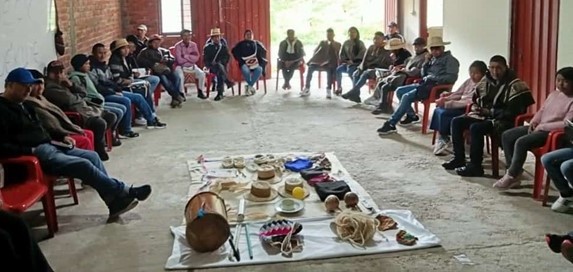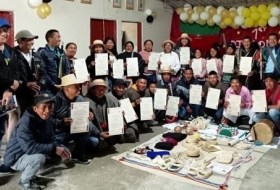News
Unicauca and Pitayo Indigenous Resguardo Conclude Academic Event for Strengthening Nasayuwe.
Twelve female teachers and fourteen male teachers from the Nasa community were certified, and the first Nasa teachers' seedbed was created during the diploma course "Thinking the Nasa Language for the Strengthening of Oral Communication and Composition in Nasayuwe" (Nasayuwe's çxhāçxha we'weya' sa' txa'wēy ew fxi'jya' kaapiya'jwa'ja's ūusyaatxni dxi’j).
On Saturday, February 24, the closing ceremony of the first Diploma Course for Nasayuwe-speaking teachers from the Nasa community, titled "Thinking the Nasa Language for the Strengthening of Oral Communication and Composition in Nasayuwe," was held at the Resguardo Indígena de Pitayo. The process was supported by the Center for Continuing, Open, and Virtual Education (CECAV) in collaboration with the Juan Tama Foundation of the Resguardo Indígena de Pitayo. The academic coordination was led by Professor Sindy Perdomo from the Department of Intercultural Studies and the Center for Ethnic Memories at the University of Cauca.
In this way, the first Nasayuwe teacher training group was established, and 12 female and 14 male teachers from the Nasa community were certified. Additionally, four children from the community were involved. Among the achievements, the improvement in the use of the unified Nasayuwe alphabet by the participating teachers stands out. The enhancement of Nasayuwe's prestige and community interest in its learning, along with the connection of local authorities to the revitalization processes of this language, were also notable accomplishments.
The contribution of the Nasa linguist kapiya'jsa, Adonías Perdomo Dizu, is also appreciated. Throughout this period, he shared his knowledge with the group of teachers and supported the community training.

Provided photo
Text of the note in Nasayuwe:
Kaba wejxa
Kwe’sxyakha’ Wala weçxyuha’, naa thẽ’jsawe’sx, piçtatxwe’sx kĩ, luuçxkwewe’sx txa’we nasayuwe’s yafte tegya’, sa’ txa’wẽy fxi’jwa’ja’spa txa’wẽy piyaya’ takhpa’ka. Naawẽ’sxa’: puçutx, kaaphĩçhe’ wejxatx, je’ga’j wejxatx, pẽtxhte kãasa yuthwejxatx txãana’wẽçxah atya’ piyapa’ka. Nee iita’ napa pu’çxhna, atna kĩ’ wejxkwe’ utenan kapiya’the’, tuhd tuhda’ wala kwe’sx yuwe’s atpuçxhwa’jsata’.
Txa’wẽiçxaa, naa diplumadũ mjĩĩa’ kwe’sx nasayuwe’s fxi’jya’ piiyawa’jas kwe’sx nasatx wala fxĩthku, naa e’su kĩ’ nasayuwe piyawa’j mjĩia’s takhte’ wejx ithaakwe pa’j we’wenatx neyũu.
Sa’, txa’wẽy, kwe’sx kiwekhabu neehwe’sxpa wala weçxana neyũutx naa mjĩia’s txwespaka. Naajunxa’ja, kwe’sx neehwe’sxtxi wala ew ãate kaajiyu’çxha kĩ’ kaapiya’j mjĩia’s takhte’, pu’çxhya’ neyũutx, txãapa’ka FUNDACIÒN JUAN TAMAyakha, wala weçxyuha’.
Txa’wẽyiçxaa, Universidad del Cauca’spa imeh wala weçxa’thaw kwe’sx piyasaawe’txi, PIYAKHABUS (diploma) itxuudepa’ka. Kĩ’ piyamjĩitepa nuu pi’txpaça’ sũhnatha’w ipi’txi.
Fxijsa: Fundación Juantamate Neehwe’sx
For more information:
Ethnic Memories Center


